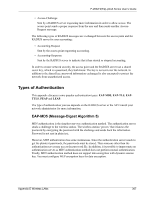ZyXEL P-2602HW-D3A User Guide - Page 370
Security Parameters Summary
 |
View all ZyXEL P-2602HW-D3A manuals
Add to My Manuals
Save this manual to your list of manuals |
Page 370 highlights
P-2602H(W)(L)-DxA Series User's Guide The Message Integrity Check (MIC) is designed to prevent an attacker from capturing data packets, altering them and resending them. The MIC provides a strong mathematical function in which the receiver and the transmitter each compute and then compare the MIC. If they do not match, it is assumed that the data has been tampered with and the packet is dropped. By generating unique data encryption keys for every data packet and by creating an integrity checking mechanism (MIC), TKIP makes it much more difficult to decrypt data on a Wi-Fi network than WEP, making it difficult for an intruder to break into the network. The encryption mechanisms used for WPA and WPA-PSK are the same. The only difference between the two is that WPA-PSK uses a simple common password, instead of user-specific credentials. The common-password approach makes WPA-PSK susceptible to brute-force password-guessing attacks but it's still an improvement over WEP as it employs an easier-touse, consistent, single, alphanumeric password. Security Parameters Summary Refer to this table to see what other security parameters you should configure for each Authentication Method/ key management protocol type. MAC address filters are not dependent on how you configure these security features. Table 149 Wireless Security Relational Matrix AUTHENTICATION METHOD/ KEY MANAGEMENT PROTOCOL ENCRYPTION METHOD ENTER MANUAL KEY Open Open Shared WPA WPA WPA-PSK WPA-PSK None No WEP No Yes Yes WEP No Yes Yes WEP No TKIP No WEP Yes TKIP Yes ENABLE IEEE 802.1X No Enable with Dynamic WEP Key Enable without Dynamic WEP Key Disable Enable with Dynamic WEP Key Enable without Dynamic WEP Key Disable Yes Yes Yes Yes 370 Appendix E Wireless LANs















